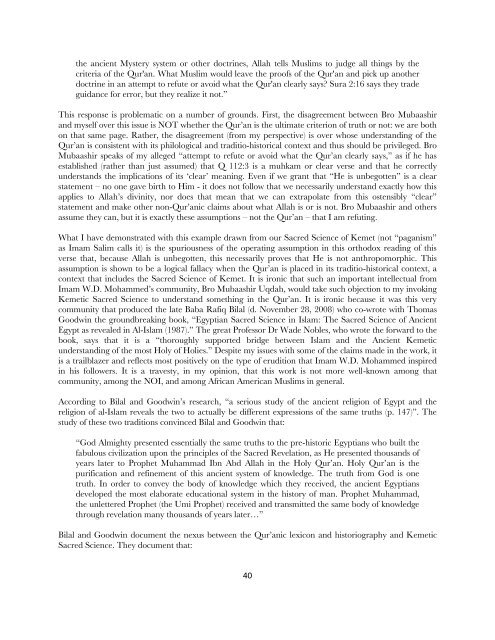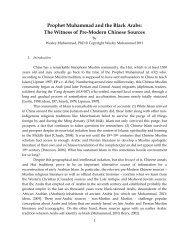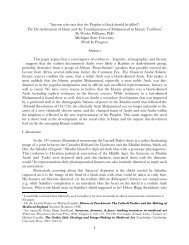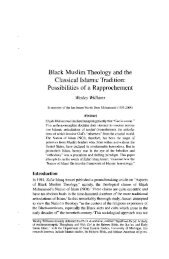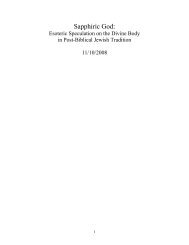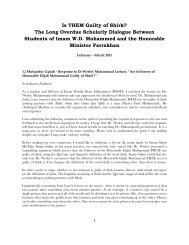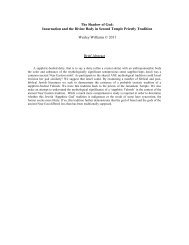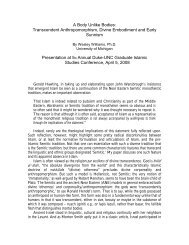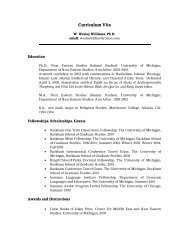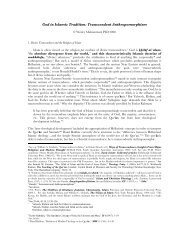Is THEM Guilty of Shirk? - Dr. Wesley Muhammad
Is THEM Guilty of Shirk? - Dr. Wesley Muhammad
Is THEM Guilty of Shirk? - Dr. Wesley Muhammad
You also want an ePaper? Increase the reach of your titles
YUMPU automatically turns print PDFs into web optimized ePapers that Google loves.
the ancient Mystery system or other doctrines, Allah tells Muslims to judge all things by the<br />
criteria <strong>of</strong> the Qur'an. What Muslim would leave the pro<strong>of</strong>s <strong>of</strong> the Qur'an and pick up another<br />
doctrine in an attempt to refute or avoid what the Qur'an clearly says? Sura 2:16 says they trade<br />
guidance for error, but they realize it not.‖<br />
This response is problematic on a number <strong>of</strong> grounds. First, the disagreement between Bro Mubaashir<br />
and myself over this issue is NOT whether the Qur‘an is the ultimate criterion <strong>of</strong> truth or not: we are both<br />
on that same page. Rather, the disagreement (from my perspective) is over whose understanding <strong>of</strong> the<br />
Qur‘an is consistent with its philological and traditio-historical context and thus should be privileged. Bro<br />
Mubaashir speaks <strong>of</strong> my alleged ―attempt to refute or avoid what the Qur‘an clearly says,‖ as if he has<br />
established (rather than just assumed) that Q 112:3 is a muhkam or clear verse and that he correctly<br />
understands the implications <strong>of</strong> its ‗clear‘ meaning. Even if we grant that ―He is unbegotten‖ is a clear<br />
statement – no one gave birth to Him - it does not follow that we necessarily understand exactly how this<br />
applies to Allah‘s divinity, nor does that mean that we can extrapolate from this ostensibly ―clear‖<br />
statement and make other non-Qur‘anic claims about what Allah is or is not. Bro Mubaashir and others<br />
assume they can, but it is exactly these assumptions – not the Qur‘an – that I am refuting.<br />
What I have demonstrated with this example drawn from our Sacred Science <strong>of</strong> Kemet (not ―paganism‖<br />
as Imam Salim calls it) is the spuriousness <strong>of</strong> the operating assumption in this orthodox reading <strong>of</strong> this<br />
verse that, because Allah is unbegotten, this necessarily proves that He is not anthropomorphic. This<br />
assumption is shown to be a logical fallacy when the Qur‘an is placed in its traditio-historical context, a<br />
context that includes the Sacred Science <strong>of</strong> Kemet. It is ironic that such an important intellectual from<br />
Imam W.D. Mohammed‘s community, Bro Mubaashir Uqdah, would take such objection to my invoking<br />
Kemetic Sacred Science to understand something in the Qur‘an. It is ironic because it was this very<br />
community that produced the late Baba Rafiq Bilal (d. November 28, 2008) who co-wrote with Thomas<br />
Goodwin the groundbreaking book, ―Egyptian Sacred Science in <strong>Is</strong>lam: The Sacred Science <strong>of</strong> Ancient<br />
Egypt as revealed in Al-<strong>Is</strong>lam (1987).‖ The great Pr<strong>of</strong>essor <strong>Dr</strong> Wade Nobles, who wrote the forward to the<br />
book, says that it is a ―thoroughly supported bridge between <strong>Is</strong>lam and the Ancient Kemetic<br />
understanding <strong>of</strong> the most Holy <strong>of</strong> Holies.‖ Despite my issues with some <strong>of</strong> the claims made in the work, it<br />
is a trailblazer and reflects most positively on the type <strong>of</strong> erudition that Imam W.D. Mohammed inspired<br />
in his followers. It is a travesty, in my opinion, that this work is not more well-known among that<br />
community, among the NOI, and among African American Muslims in general.<br />
According to Bilal and Goodwin‘s research, ―a serious study <strong>of</strong> the ancient religion <strong>of</strong> Egypt and the<br />
religion <strong>of</strong> al-<strong>Is</strong>lam reveals the two to actually be different expressions <strong>of</strong> the same truths (p. 147)‖. The<br />
study <strong>of</strong> these two traditions convinced Bilal and Goodwin that:<br />
―God Almighty presented essentially the same truths to the pre-historic Egyptians who built the<br />
fabulous civilization upon the principles <strong>of</strong> the Sacred Revelation, as He presented thousands <strong>of</strong><br />
years later to Prophet <strong>Muhammad</strong> Ibn Abd Allah in the Holy Qur‘an. Holy Qur‘an is the<br />
purification and refinement <strong>of</strong> this ancient system <strong>of</strong> knowledge. The truth from God is one<br />
truth. In order to convey the body <strong>of</strong> knowledge which they received, the ancient Egyptians<br />
developed the most elaborate educational system in the history <strong>of</strong> man. Prophet <strong>Muhammad</strong>,<br />
the unlettered Prophet (the Umi Prophet) received and transmitted the same body <strong>of</strong> knowledge<br />
through revelation many thousands <strong>of</strong> years later…‖<br />
Bilal and Goodwin document the nexus between the Qur‘anic lexicon and historiography and Kemetic<br />
Sacred Science. They document that:<br />
40


